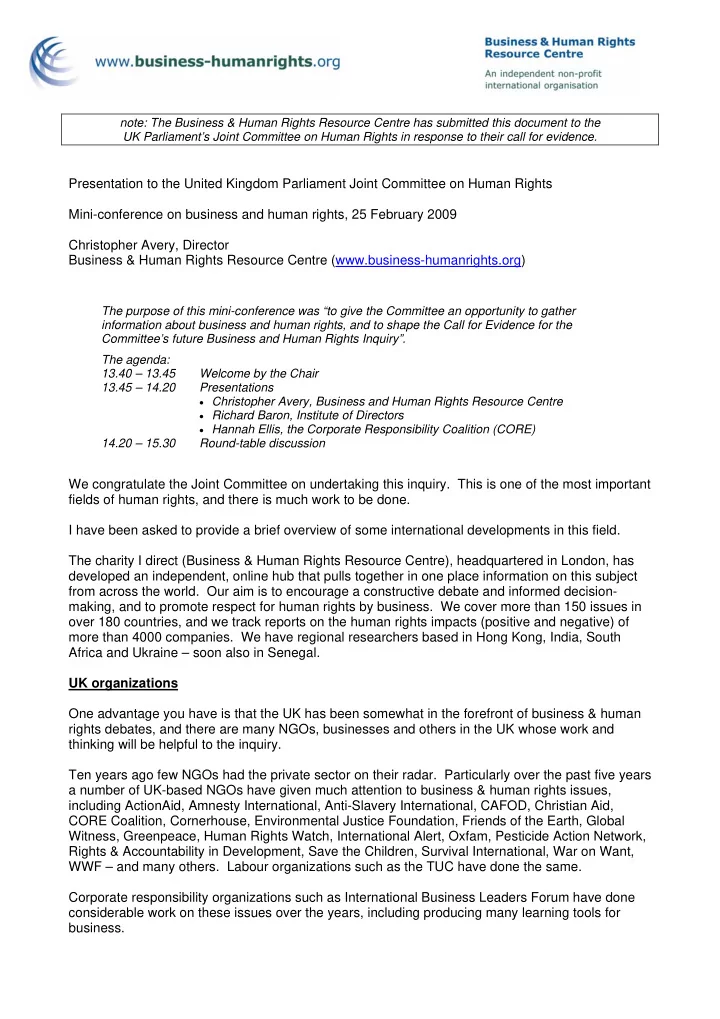

note: The Business & Human Rights Resource Centre has submitted this document to the UK Parliament’s Joint Committee on Human Rights in response to their call for evidence. Presentation to the United Kingdom Parliament Joint Committee on Human Rights Mini-conference on business and human rights, 25 February 2009 Christopher Avery, Director Business & Human Rights Resource Centre (www.business-humanrights.org) The purpose of this mini-conference was “to give the Committee an opportunity to gather information about business and human rights, and to shape the Call for Evidence for the Committee’s future Business and Human Rights Inquiry”. The agenda: 13.40 – 13.45 Welcome by the Chair 13.45 – 14.20 Presentations • Christopher Avery, Business and Human Rights Resource Centre • Richard Baron, Institute of Directors • Hannah Ellis, the Corporate Responsibility Coalition (CORE) 14.20 – 15.30 Round-table discussion We congratulate the Joint Committee on undertaking this inquiry. This is one of the most important fields of human rights, and there is much work to be done. I have been asked to provide a brief overview of some international developments in this field. The charity I direct (Business & Human Rights Resource Centre), headquartered in London, has developed an independent, online hub that pulls together in one place information on this subject from across the world. Our aim is to encourage a constructive debate and informed decision- making, and to promote respect for human rights by business. We cover more than 150 issues in over 180 countries, and we track reports on the human rights impacts (positive and negative) of more than 4000 companies. We have regional researchers based in Hong Kong, India, South Africa and Ukraine – soon also in Senegal. UK organizations One advantage you have is that the UK has been somewhat in the forefront of business & human rights debates, and there are many NGOs, businesses and others in the UK whose work and thinking will be helpful to the inquiry. Ten years ago few NGOs had the private sector on their radar. Particularly over the past five years a number of UK-based NGOs have given much attention to business & human rights issues, including ActionAid, Amnesty International, Anti-Slavery International, CAFOD, Christian Aid, CORE Coalition, Cornerhouse, Environmental Justice Foundation, Friends of the Earth, Global Witness, Greenpeace, Human Rights Watch, International Alert, Oxfam, Pesticide Action Network, Rights & Accountability in Development, Save the Children, Survival International, War on Want, WWF – and many others. Labour organizations such as the TUC have done the same. Corporate responsibility organizations such as International Business Leaders Forum have done considerable work on these issues over the years, including producing many learning tools for business.
2 UK businesses and business organizations have become much more engaged in these discussions over recent years. For example, Barclays, Body Shop and National Grid have taken part in the Business Leaders Initiative on Human Rights, a group of companies working with Mary Robinson and others to operationalise human rights in there core business. BP developed a human rights training guide for its managers. Many UK companies participate in the UN Global Compact. Over half of the FTSE 100 companies have adopted a formal human rights policy statement – I believe this is the highest percentage of any country. Continuing concerns Despite clear progress, there are many challenges, and while my colleagues and I increasingly post on our website reports of positive human rights initiatives by business, much of our time is spent posting reports of alleged abuses by companies. Civil society in developing countries One of the most important developments over the past five years has been that NGOs and community groups in developing countries have been giving much more attention to human rights issues relating to the private sector. But too often their voices are left out of debates in Europe and North America. I hope your inquiry will find ways to include input from those in developing countries who have been affected by the operations of UK companies. The work of John Ruggie John Ruggie was appointed in 2005 by Kofi Annan as Special Representative of the UN Secretary General on business & human rights. He is a Harvard professor of international relations who directed the Center for Business and Government at Harvard’s Kennedy School of Government, and had served as an Assistant Secretary-General of the United Nations. Professor Ruggie’s 28-page 2008 report starts off with a frank recognition of the problems in this field: “The root cause of the business and human rights predicament today lies in the governance gaps created by globalization. These governance gaps provide the permissive environment for wrongful acts by companies without adequate sanctioning or reparation. How to narrow and ultimately bridge the gaps in relation to human rights is our fundamental challenge.” His report puts forward a three-part framework: • the State duty to protect against human rights abuses by business • the corporate responsibility to respect human rights • the need for greater access by victims to effective remedies Addendum 2 of his report summarized the scope and patterns of alleged corporate-related human rights abuse found in a sample of 320 cases posted on the Business & Human Rights Resource Centre website from February 2005 to December 2007. Professor Ruggie noted that all industry sectors were alleged to impact human rights, and impacts were alleged to occur in all regions. He found that corporations are alleged to have impacted the full range of human rights: civil, political, economic, social and cultural. The UN Human Rights Council was unanimous in welcoming Ruggie’s framework and in extending Ruggie’s mandate for another three years, asking him to focus now on operationalising this framework, by providing more concrete content and guidance for states and companies. Since being appointed Professor Ruggie has convened a total of about 15 multi-stakeholder consultations on five continents and conducted more than 25 research projects – the reports of
Recommend
More recommend